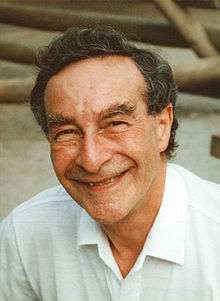Norman Greenwood
| Norman Neill Greenwood | |
|---|---|
 | |
| Born |
January 19, 1925 Melbourne, Australia |
| Died |
November 14, 2012 (aged 87) Leeds, United Kingdom |
| Nationality | Australian-British |
| Fields | Inorganic chemistry |
| Institutions |
University of Newcastle upon Tyne University of Leeds |
| Alma mater | Sidney Sussex College, Cambridge |
| Doctoral advisor | Harry Julius Emeléus |
| Notable students | Kenneth Wade |
| Known for |
Boron chemistry Determination of atomic weights The textbook Chemistry of the Elements |
Norman Neill Greenwood FRS CChem FRSC (19 January 1925 – 14 November 2012[1][2][3]) was an Australian-British chemist and Emeritus Professor at the University of Leeds.[4] He is probably most well known for the innovative textbook Chemistry of the Elements, co-authored with Alan Earnshaw, first published in 1984.
Biography
After attending University High School (1939–42), he read Chemistry at the University of Melbourne and graduated with a BSc in 1945 and an MSc in 1948. In 1948 he was awarded the Exhibition of 1851 Scholarship to enable him to read for a PhD at Sidney Sussex College, Cambridge under the supervision of Harry Julius Emeléus. He received the PhD in 1951.[5]
Greenwood was a Senior Research Fellow at the Atomic Energy Research Establishment from 1951 until 1953 when he was appointed a Lecturer at the University of Nottingham. His first PhD student at Nottingham was Kenneth Wade (1954-1957).[6]
Professor William Wynne-Jones, who was the Chairman of the School of Chemistry at Kings College, Durham (which was to become the University of Newcastle upon Tyne in 1963), recruited Greenwood to the first established Chair of Inorganic Chemistry in the country in 1961.
Greenwood was appointed Professor and Head of the Department of Inorganic and Structural Chemistry at the University of Leeds in 1971, a post which he held until his retirement in 1990 when he was given the title Emeritus Professor.
Greenwood was elected a Fellow of the Royal Society (FRS) in 1987.[7]
His wide-ranging researches in inorganic and structural chemistry have made major advances in the chemistry of boron hydrides and other main-group element compounds. He also pioneered the application of Mössbauer spectroscopy to problems in chemistry. He is a prolific writer and inspirational lecturer on chemical and educational themes, and has held numerous visiting professorships throughout the world. He was appointed by NASA as principal investigator in the study of lunar rocks.[4] He served as chairman of the IUPAC Commission on Atomic Weights from 1970-1975 and also as president of the IUPAC Inorganic Chemistry Division.[5]
Works
- Greenwood, N.N. (1968). Principles of Atomic Orbitals - Monograph for Teachers. Royal Society of Chemistry. p. 48. ISBN 9780854040285.
- Greenwood, N.N. (1968). Ionic crystals, lattice defects and nonstoichiometry. Butterworths. p. 194.
- Greenwood, N.N; Gibb, T.C. (1971). Mössbauer Spectroscopy. Chapman and Hall. p. 659.
- Greenwood, Norman N.; Earnshaw, Alan (1997). Chemistry of the Elements (2nd ed.). Butterworth-Heinemann. p. 1340. ISBN 0-08-037941-9.
- Greenwood, N.N. (2012). Recollections of a Scientist Volume 1. Boyhood and Youth in Australia. Xlibris Corporation. p. 288. ISBN 1-4691-7935-0.
- Greenwood, N.N. (2012). Recollections of a Scientist, Volume 2: Expanding Horizons: England and Europe (1948-51). Xlibris Corporation. p. 438. ISBN 978-1477151860.
Editor: Spectroscopic Properties of Inorganic and Organometallic Compounds, Royal Society of Chemistry, Volume 1 (1968) to Volume 9 (1976)
References
- ↑ University of Leeds, Obituary notice
- ↑ Perkins, Peter (27 November 2012). "Norman Greenwood | Science | guardian.co.uk". London: Guardian. Retrieved 2012-11-27.
- ↑ Obituary notice, The Times, 30 November 2012
- 1 2 Johnson, Brian (25 November 2011). "Norman Greenwood tells his life story (May 2011)". Web of Stories. Retrieved July 30, 2012.
- 1 2 University of Leeds, Obituary
- ↑ Wade, Kenneth (May 21, 2009). "Harry Julius Emeleus (1903 - 1993)" (PDF). Chemical Genealogy Database. University of Illinois at Urbana–Champaign. Retrieved July 31, 2012.
- ↑ Royal Society, List of Fellows
External links
| ||||||